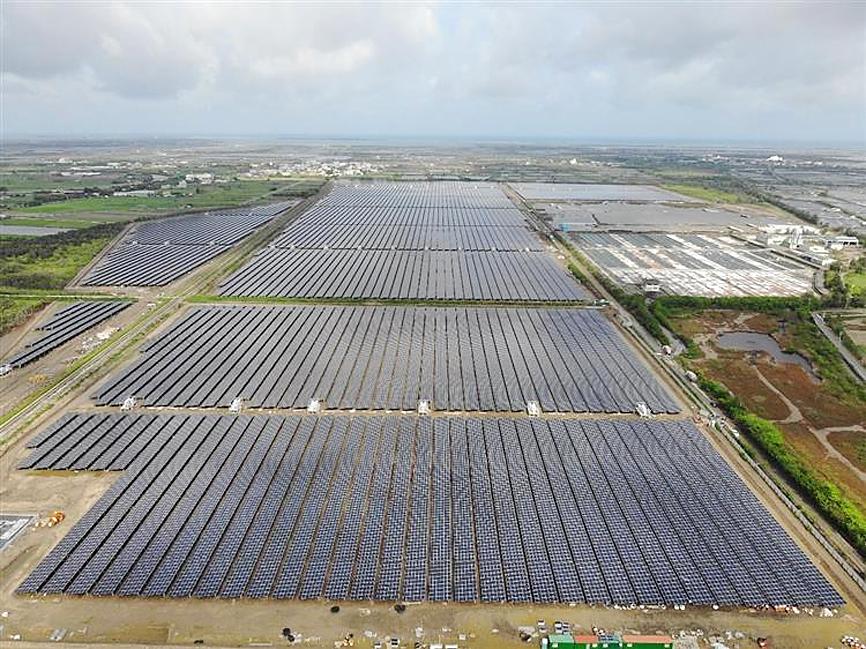Taiwan’s largest ground-level solar farm, a 181-megawatt (MW) project in Tainan’s Cigu District (七股), joined the nation’s electricity grid at the end of last month, state-run Taiwan Sugar Co (Taisugar, 台糖) said yesterday.
By the end of the year, the company plans to expand the project to provide up to 216MW of electricity, the equivalent of 300 million kilowatt hours per year, or the equivalent of the annual electricity consumption of 83,000 homes, Taisugar said in a press release.
The Cigu solar project sits on 189 hectares of land deemed “not suitable for cultivation” by Taisugar, it said.

Photo courtesy of Taiwan Sugar Co
After a bidding process in 2019, the tender for the project went to Chung-hsin Electric and Machinery Manufacturing Corp (中興電工).
It is the first — but not the last — Taisugar green power project built on land not suitable for farming, it said.
“We hope to repeat the formula for other suitable parcels [of land] owned by Taisugar,” it said, without elaborating.
Taiwan’s sugarcane trade once flourished and sugar was a major export. Taisugar, established in 1946 by the government, has diversified into various businesses, including a chain of convenience stores, hog farming, floriculture and biotechnology, as the cost structure of domestic sugar production waned in the past few decades.
Turning agricultural land into solar farms has been controversial in Taiwan, with some arguing that it needs to be preserved for food security reasons.
However, the Cigu lot was not under cultivation and could not be brought under cultivation, easing its transition into a solar farm, Taisugar said.
“The land used in the solar project suffered from subsidence and salt contamination, and struggled to support sugar cane, as well as other crops,” Taisugar said.

Taiwan Semiconductor Manufacturing Co (TSMC, 台積電), the world’s biggest contract chipmaker, booked its first-ever profit from its Arizona subsidiary in the first half of this year, four years after operations began, a company financial statement showed. Wholly owned by TSMC, the Arizona unit contributed NT$4.52 billion (US$150.1 million) in net profit, compared with a loss of NT$4.34 billion a year earlier, the statement showed. The company attributed the turnaround to strong market demand and high factory utilization. The Arizona unit counts Apple Inc, Nvidia Corp and Advanced Micro Devices Inc among its major customers. The firm’s first fab in Arizona began high-volume production

VOTE OF CONFIDENCE: The Japanese company is adding Intel to an investment portfolio that includes artificial intelligence linchpins Nvidia Corp and TSMC Softbank Group Corp agreed to buy US$2 billion of Intel Corp stock, a surprise deal to shore up a struggling US name while boosting its own chip ambitions. The Japanese company, which is adding Intel to an investment portfolio that includes artificial intelligence (AI) linchpins Nvidia Corp and Taiwan Semiconductor Manufacturing Co (TSMC, 台積電), is to pay US$23 a share — a small discount to Intel’s last close. Shares of the US chipmaker, which would issue new stock to Softbank, surged more than 5 percent in after-hours trading. Softbank’s stock fell as much as 5.4 percent on Tuesday in Tokyo, its

COLLABORATION: Softbank would supply manufacturing gear to the factory, and a joint venture would make AI data center equipment, Young Liu said Hon Hai Precision Industry Co (鴻海精密) would operate a US factory owned by Softbank Group Corp, setting up what is in the running to be the first manufacturing site in the Japanese company’s US$500 billion Stargate venture with OpenAI and Oracle Corp. Softbank is acquiring Hon Hai’s electric-vehicle plant in Ohio, but the Taiwanese company would continue to run the complex after turning it into an artificial intelligence (AI) server production plant, Hon Hai chairman Young Liu (劉揚偉) said yesterday. Softbank would supply manufacturing gear to the factory, and a joint venture between the two companies would make AI data

The Taiwan Automation Intelligence and Robot Show, which is to be held from Wednesday to Saturday at the Taipei Nangang Exhibition Center, would showcase the latest in artificial intelligence (AI)-driven robotics and automation technologies, the organizer said yesterday. The event would highlight applications in smart manufacturing, as well as information and communications technology, the Taiwan Automation Intelligence and Robotics Association said. More than 1,000 companies are to display innovations in semiconductors, electromechanics, industrial automation and intelligent manufacturing, it said in a news release. Visitors can explore automated guided vehicles, 3D machine vision systems and AI-powered applications at the show, along